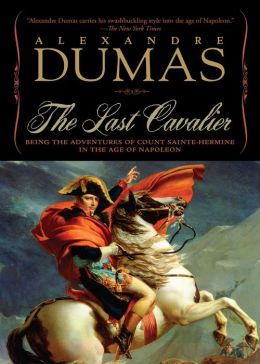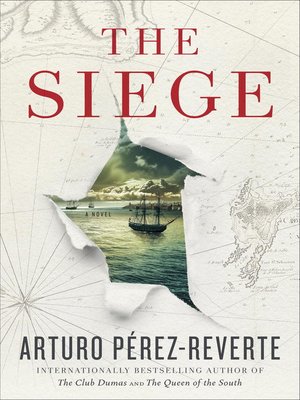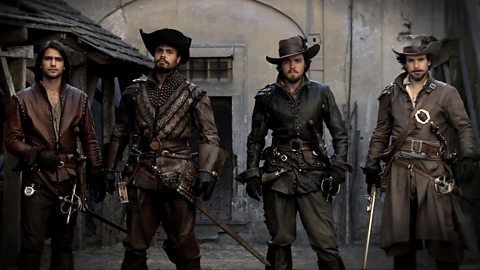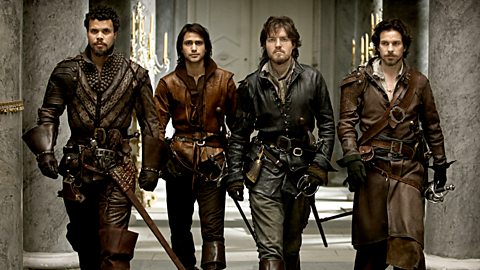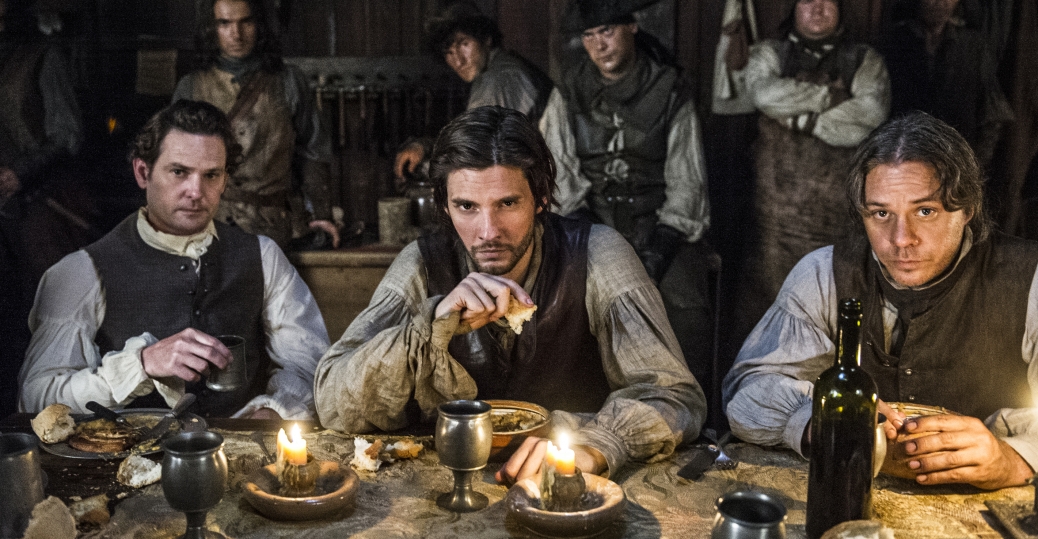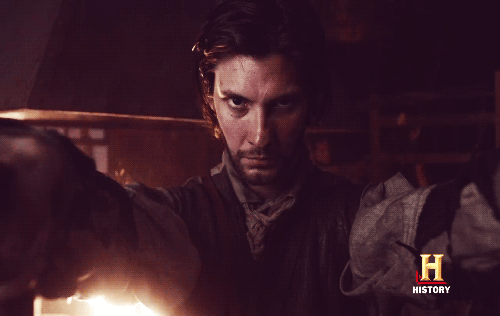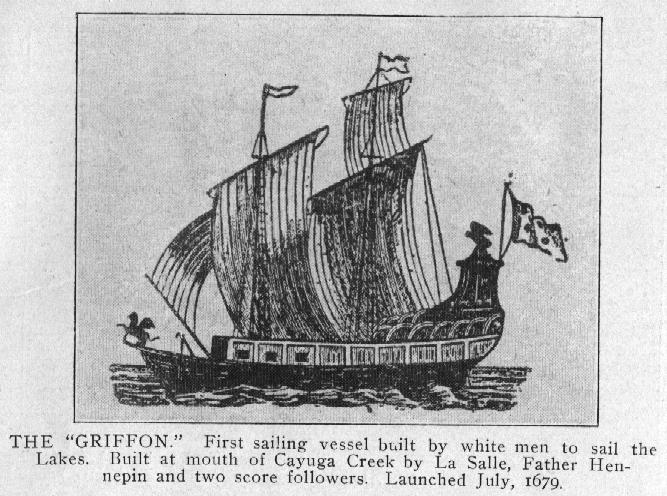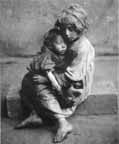The historical novel first: The Siege (English trans. 2013; Random House) by Arturo Pérez-Reverte. Pérez-Reverte is the author of the 17th century series featuring Spanish hidalgo swordsman nonpareil, Captain Alatriste. The Alatriste books' actions are fairly contemporaneous with many of those in Dumas's The Three Musketeer series, during which France and Spain often clashed in battle, particularly in what will become the Netherlands. It's not inconceivable that the fictional musketeers and equally fictional Alatriste may have shared a desperate encounter in the flooded fields of Flanders . . . .
Note: among Pérez-Reverte's previous books is The Club Dumas, the action of which is provoked by " an original handwritten chapter from Alexander Dumas's The Three Musketeers . . ."
As we all know, Alexander Dumas, after Walter Scott, is the father and godfather of the historical novel, so that is illuminating that The Last Cavalier a/k/a The Knight of St. Hermine, Dumas's long overlooked valedictory novel, deals with Napoleón and his era,
The Siege is set in the Napoleónic era, when Spain and France are again at war. Cádiz has been sieged for year by the French when women turn up murdered. It's up to Police Comisario Rogelio Tizón to investigate. It seems from the cover copy that his investigation will turn up something more than a 'mere' serial killer. This is the first time I will be reading any historical fiction about the Napoleónic wars in Spain written by a Spanish novelist.
The Adams Family is back! The Remarkable Education of John Quincy Adams (2015, Macmillon) by Phyllis Lee Levin. The title cleverly plays upon the famous Education of Henry Adams, the peculiar memoir-complaint penned by JQA's grandson. The author drew heavily upon JQA's remarkable journal, which she agrees with us may be the most remarkable historic national document created by any of our Great Men -- or Great Women, for that matter. Best of all, JQA's wife, Louisa Catherine is front and center. That she managed to stay living with this impossible -- if brilliant and principled -- man all those years alone makes her deserving of her place in the book.
I also have Eyre Crowe's With Thackeray in America, which contains some of the more famous drawing of slave auctions and so on from the 1853 visit
(Thackeray (author of Vanity Fair -- in which, coincidentally, the Battle of Waterloo plays a significant role -- among other Victorian era bestselling novels) was not impressed with the U.S.). The book isn't in print these days; the copy I have was published in 1893, however it can be seen online.
Did ever an artist have a more "artistic / romantic" name than Eyre Crowe?
Friday, January 30, 2015
Thursday, January 29, 2015
Colleen McCullough (1937 - 2014)
Colleen McCullough (1937 - 2014) has died at age 77, after writing many successful novels, including her most famous, The Thornbirds, which was also a most successful television series.
But the books of hers I admired were those which made up her long narrative histories, the 7-volume series she titled Masters of Rome. The research she did for Masters of Rome was as impressive as any credentialed academic scholar would have. If I have this right, she even learned to read Latin, while being directed in her research by professional academic scholars.
Before she began writing bestsellers, McCollough, an Australian, was a neuroscientist researcher at Yale University.
But the books of hers I admired were those which made up her long narrative histories, the 7-volume series she titled Masters of Rome. The research she did for Masters of Rome was as impressive as any credentialed academic scholar would have. If I have this right, she even learned to read Latin, while being directed in her research by professional academic scholars.
Before she began writing bestsellers, McCollough, an Australian, was a neuroscientist researcher at Yale University.
Wednesday, January 28, 2015
The Musketeers - 2014 season 1 BBC1 - BBC America
I'd suspected that like many English language productions based on the Dumas père's novel this one too would be bombast that had no part in the author's buoyant ripostes, and filled with physical gags grounded in contemporary pop culture references. Worse, it would be non-stop frantic action sequences, particularly at the beginning -- chasing each other through Paris, with many interrupted duels, as we learn who the Three are and who D'Artagnan is, and how they overcome their differences to become the Four.
The first episode fulfilled none of my suspicions. It was buoyant, with more darkness and depth of situations than is usually provided in English language productions of The Three Musketeers, in which scenes are played for laughs. It looked good, shot in Prague, standing in for 17th century Paris, in the Czech Republic. However, this means that the glorious spaces of palaces and halls are non-realistically empty and unfurnished for the historical court of Louis XIII, It's also so cold that the actors' breath vapor is captured onscreen, even in indoor scenes within these palace rooms. But, after watching four episodes, this is the only criticism I can make, and it's so mild as to be mentioned only to observe I noticed.
The costumes were fairly period. Best of all, in this first episode the weight and stiffness are palpable of that "dashing" cavalier musketeer leather, whether as jackboots, coats -- meaning the outer garment worn by the fellow in the back of the top photo, or on our far right in the second photo above -- whatever is the correct term for that outer coat -- jaquette? that can't be right -- riding gauntlets, sword scabbards, weapons and horse tack.
The actors, male and female, are as pleasing to the eye as are the horses, so there's that as well. The horses are heavy, bred for military action.
On the other end of the spectrum King Louis XIII is more pleasing to the eye than he ever was in life, with his double row of front teeth, protruding tongue, speech impediment and so on. The way the actor, Ryan Gage, plays the speech impediment and stammer on screen is by suggestion: a stop in his speech, as if he's considering what he's going to say, followed by a faint flicker of uncertainty around his mouth, a tilt and tightening of his neck. These faint facial expressions -- which are not in every scene, so they don't make the King look predictably foolish (and Louis was perhaps too dependent on others, but he wasn't a weakling or a fool -- add surprising dimension to King Louis's portrayal. We like looking at him, because he's interesting, He carries himself like a French king of the 17th century, but he's not a featureless piece of wood who must roar and stomp -- or be a foolish weakling -- in order to convey he's human, though 100% royal.
Moreover, for me, having some historical knowledge of Louis XIII and his reign, knowing why he might be writing letters to the Spanish king -- and indeed who the Spanish king was, and that the Hapsburg emperor was also Spanish, meaning France is surrounded by Spain -- has added a whole other level to entertainment I am getting from this series. This production doesn't seem afraid of history, and I much appreciate that.
The BBC currently is in the process of running the second series of The Musketeers, though without Peter Capaldi as Cardinal Richelieu, due to prior commitments to Dr. Who (of Hoo I've never watched a single episode of any series. It's been on, like, what? since before I was born?).
The Musketeers finds its stride in the third episode.
Until the third episode, nothing whatever was made of Porthos as a man of color, played by Howard Charles. This is very cool, I thought, with the history of people of color in France in general, in the arts and the military particularly, and most of all, the history of Alexander Dumas's father. This is a television entertainment set in 17th France, that acknowledges there were people of color with agency in France (until Napoleón changed that, including breaking down Alexander Dumas's father, a general in la Grande Armée, due to his racism, shared with his Empress Josephine, from slaveholding Martinique.), But, gradually over the course of the third episode it gets even better than.that. The first hint is the episode's title, "Commodities."
The musketeers are tasked by the King with the protection of merchant adventurer, Bonnaire. He turns out to be a semi-sympathetic con man, who is cheating everyone he has anything to do with. About half way through comes the reveal that centers around Porthos, and which will not be spoiled here. But suffice it to say that every aspect of this reveal is based in historical fact. But it gets better than that too -- there are arguments and discussions among the musketeers and Bonnaire as to morality of the reveal and what it means in terms of musketeer loyalty, national wealth and trade. This isn't something one sees on television much, and not in an action adventure series that still manages to keep a certain lightness of touch.
And then, in terms of the writing, we have a second big reveal, and this is about Athos. These two different reveals both work within a single episode of an action-adventure structure.
I sweep my chapeau from my head in acknowledgment to how good these writers are.
 |
| Constance Bonscieux, D'Artagnon's landlady, who is interestied in guns and swords as a way to add a little more spark to her life beyond housekeeping and being shop assistant to her husband. |
 |
| Queen Anne (of Austria) also wishes for more to her role as a woman and queen than standing around as a symbol of the king . |
 |
| Milady is perfectly cast and played. |
 |
| Queen Anne, Louis's sister, the Duchess of Savoy, and her son, Louis's nephew (who, speaking historically, at this time is Louis's only heir). |
The music score for the opening credits music promises action, historical-adventure and some darkness. The series follows through.
Labels:
17th century,
European history,
french history,
Television
Monday, January 26, 2015
Grantchester - season 1 - PBS / ITV
The first two episodes of the current PBS Masterpiece Mysteries series, Grantchester, (shown first on the ITV network in 2014) proved the program watchable. It's the sort of mildly pleasant distraction, with nice scenery and an ensemble of nice characters and nice little who-did-its that don't matter all that much that I like at this time of a snittering full snart sort of winter day. The series is based on The Grantchester Mysteries written by James Runcie.
The main character, Vicar Sydney Chambers, is played attractively by an attractive actor. The recurring characters are decent people, and treat each other decently. Did I mention that Grantchester is nice, and pleasant?
Its temporal locality is 1953. Sydney carries physical scars from WWII, as well as emotional scars from what happened to him in combat. However, Grantchester may not be particularly reflective of 1950's reality: sister Jen has black jazz club owning musician Johnny as her boyfriend, and Sydney does not mind; his new curate, Leonard Finch, is gay, and Sydney doesn't mind;
they bonded almost immediately via Irish whiskey, so Geordie Green the cop-partner-in-sleauthing respects the Vicar despite declaring himself a non-believer (though he has given indication that he does mind the introduction of "the pansy" to the comfortable group, but surely he will be set right in the next episode); Mrs. McGuire, the vicarage's housekeeper, is already starting to show herself as nicer than we thought at first, though we already have tired of her favorite expletive, "What the dickens?"
Everyone is well-nourished, healthy, with all their nice white teeth in place, and the wardrobe is beautifully interpreted 1950's design, that makes the period's clothes look better than they looked in 1953.
And there's a black lab puppy and lots of Louis Armstrong -- since our vicar loves jazz, though only a curmudgeon would observe the way the Vicar and Johnny talk about "jazz" that maybe they don't know anything about it? Perhaps most of the budget goes to the licenses to use these very familiar jazz cuts by the very famous musicians like Satchmo? And to the wardrobe designer?
The only unlikeables are "gentry" and rich men -- and though we're not supposed to dislike her, we do dislike the love interest who is bound and determined to marry this rich gentry guy, who really appears an a$$hole, so why does the Vicar and everyone think he'll make a great husband, is a great guy and they're going to have a great marriage? He's going to beat her, we all know that. But if we're lucky the puppy, who is named -- what else? -- Dickens, will grow quickly into a big dog with big teeth and bite them both, and they'll stay in London, never to be seen in the environs of Grantchester again. They are not nice.
The main character, Vicar Sydney Chambers, is played attractively by an attractive actor. The recurring characters are decent people, and treat each other decently. Did I mention that Grantchester is nice, and pleasant?
Its temporal locality is 1953. Sydney carries physical scars from WWII, as well as emotional scars from what happened to him in combat. However, Grantchester may not be particularly reflective of 1950's reality: sister Jen has black jazz club owning musician Johnny as her boyfriend, and Sydney does not mind; his new curate, Leonard Finch, is gay, and Sydney doesn't mind;
they bonded almost immediately via Irish whiskey, so Geordie Green the cop-partner-in-sleauthing respects the Vicar despite declaring himself a non-believer (though he has given indication that he does mind the introduction of "the pansy" to the comfortable group, but surely he will be set right in the next episode); Mrs. McGuire, the vicarage's housekeeper, is already starting to show herself as nicer than we thought at first, though we already have tired of her favorite expletive, "What the dickens?"
Everyone is well-nourished, healthy, with all their nice white teeth in place, and the wardrobe is beautifully interpreted 1950's design, that makes the period's clothes look better than they looked in 1953.
And there's a black lab puppy and lots of Louis Armstrong -- since our vicar loves jazz, though only a curmudgeon would observe the way the Vicar and Johnny talk about "jazz" that maybe they don't know anything about it? Perhaps most of the budget goes to the licenses to use these very familiar jazz cuts by the very famous musicians like Satchmo? And to the wardrobe designer?
The only unlikeables are "gentry" and rich men -- and though we're not supposed to dislike her, we do dislike the love interest who is bound and determined to marry this rich gentry guy, who really appears an a$$hole, so why does the Vicar and everyone think he'll make a great husband, is a great guy and they're going to have a great marriage? He's going to beat her, we all know that. But if we're lucky the puppy, who is named -- what else? -- Dickens, will grow quickly into a big dog with big teeth and bite them both, and they'll stay in London, never to be seen in the environs of Grantchester again. They are not nice.
Sunday, January 25, 2015
"White Cotton and Black River" - The Importance of Titles and of Editors
"White Cotton and Black River" is an extended meditation on my favorite subject, the interpenetration of history and literature. This is told through four Mississippi scions, two of whom are historical figures, Newton Knight and Jefferson Davis, and two of whom are literary, William Alexander Percy and William Faulkner. Though I write only about seven books specifically, I mention many others within the context of the subjects of the seven books.
The essay turned out to be something other than initially intended. Giving up the embeds in the text of what I thought I was doing in favor of what I really was doing, was so hard, because I was so blind to those embeds. Like our original text, like our darling but irrelevant parts, getting rid of preconceived notions is almost impossible by oneself. But they are what drag down a piece of writing if allowed to remain.
Editors! We cannot have too much editorial input!
The most gratifying thing is that Editor loves it, loves it not least because he didn't know anything before about what's in it. He fell in love with Newton Knight.
I understand better now too, why I ended up with something different from what I was originally writing. It began changing because Editor hated the title I had: "Mississippi: Idyll and Elegy."
Thus I dropped the title, and was working without one. I never can compose without a title. So, I didn't know what I was doing anymore, and it took forever to get to what I got to. And I'd had all that embedded previous text composed around the now non-existent title.
So this is another first, putting a title to something finished, instead of starting with the title.
None of this matters a jot to anyone else, but it is interesting for me to think about. The writing process -- one never knows how it will proceed.
"White Cotton and Black River" is about 11,000 words, with about 18 illustrations. Before starting the revision and editorial process it was over 30, 000 words. Yah, alas, I am a very slow writer.
 |
| Steamer Katie Robbins loaded with cotton. Collection of the Old County Court House Museum, Vicksburg, Mississippi. |
Editors! We cannot have too much editorial input!
The most gratifying thing is that Editor loves it, loves it not least because he didn't know anything before about what's in it. He fell in love with Newton Knight.
I understand better now too, why I ended up with something different from what I was originally writing. It began changing because Editor hated the title I had: "Mississippi: Idyll and Elegy."
Thus I dropped the title, and was working without one. I never can compose without a title. So, I didn't know what I was doing anymore, and it took forever to get to what I got to. And I'd had all that embedded previous text composed around the now non-existent title.
So this is another first, putting a title to something finished, instead of starting with the title.
None of this matters a jot to anyone else, but it is interesting for me to think about. The writing process -- one never knows how it will proceed.
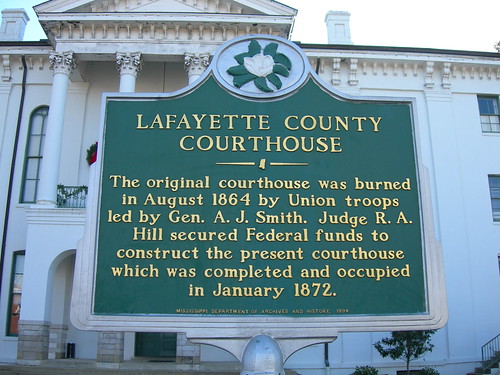 |
| Lafayette County, model for Faulkner's Yoknapawtapha County |
Labels:
historical fiction,
literature,
U.S. Civil War,
U.S. geography,
Writing
Saturday, January 24, 2015
Sons of Liberty - 3 part History Channel Scripted Series
Sons of Liberty is a three-part History Channel scripted series that dramatizes the lead up to the Declaration of Independence; it premieres Sunday night, January 25th.
Well shot, staged and scripted, the sneak peeks look promising for the whole. The primary location is Boston, so there's lots of mob violence, which is more than accurate for Boston and the push to get the Colonies to secede from English Crown rule. This also ensures that Sons of Liberty will be more generally entertaining than was AMC's attempt last year, to make small screen period drama out of our history, the earnestly dull and misfortunately titled Turn: Washington's Spies. (Nevertheless, Turn returns for season 2 on April 13.)
Sons of Liberty seems not to be entirely factually accurate, but at least the historical consultants for the series present the facts in their own video bits, for instance, emphasizing why the Crown put the tax and other regulation on tea, such as only tea from the East India Company and their agents could be sold in the Colonies, in order to bail out the bankrupt Company. I don't know, however, if the series will also tell us how much every agent in the Colonies depended on selling the lower priced smuggled tea to the financially stressed, always cash-strapped Colonies' women who found the non-taxed smuggled tea to be more than compatible with their household accounts.
It does look from the sneak videos that we will see how little the English Crown and parliamentarians knew about their North Atlantic colonies. For instance, when reading the documents from the period -- as independent historian Nick Bunker did in his recent study, An Empire on the Edge: How Britain Came to Fight America (2014), many of them seemed not to understand that the mid-Atlantic colonies such as New York, and the New England colonies, were populated mainly by white people with small farms -- completely unlike conditions in their Caribbean sugar colonies.
Sons of Liberty has been criticized in some quarters for casting so many English actors in the leading roles. However, then, one wonders: how much of the history of the Independence movement in the Colonies is understood in those quarters, since, you know, all those personages were citizens of England. It wasn't until around the Tea Party era that the Colonies's citizens began to refer to themselves as American rather than English.
Appropriately, Sons of Liberty is underwritten at least in part by Sam Adams beer, and it seems, also appropriately, by Rums of Puerto Rico. It wasn't only tea the North American colonists smuggled at astounding rates, but rum. There were also the illegal distilleries, particularly in Rhode Island, the English officials were supposed to shut down. And where did Sam Adams et al. plot? In taverns, of course. :)
I'm pulling hard that Sons of Liberty be as good as it suggests it can be. The History Channel's first redeemed itself with The Hatfields and McCoys. It's won famously with Vikings, which is currently my favorite television. But I know far less about that era, the geography and the figures than I do about the matters of Sons of Liberty, which can make a big difference in how much one enjoys a period series, as shown by the comments by Scandinavian historians who watch Vikings.
So, I'm keeping my fingers crossed.
Well shot, staged and scripted, the sneak peeks look promising for the whole. The primary location is Boston, so there's lots of mob violence, which is more than accurate for Boston and the push to get the Colonies to secede from English Crown rule. This also ensures that Sons of Liberty will be more generally entertaining than was AMC's attempt last year, to make small screen period drama out of our history, the earnestly dull and misfortunately titled Turn: Washington's Spies. (Nevertheless, Turn returns for season 2 on April 13.)
 |
| George Washington, History Channel's Sons of Liberty |
It does look from the sneak videos that we will see how little the English Crown and parliamentarians knew about their North Atlantic colonies. For instance, when reading the documents from the period -- as independent historian Nick Bunker did in his recent study, An Empire on the Edge: How Britain Came to Fight America (2014), many of them seemed not to understand that the mid-Atlantic colonies such as New York, and the New England colonies, were populated mainly by white people with small farms -- completely unlike conditions in their Caribbean sugar colonies.
Sons of Liberty has been criticized in some quarters for casting so many English actors in the leading roles. However, then, one wonders: how much of the history of the Independence movement in the Colonies is understood in those quarters, since, you know, all those personages were citizens of England. It wasn't until around the Tea Party era that the Colonies's citizens began to refer to themselves as American rather than English.
Appropriately, Sons of Liberty is underwritten at least in part by Sam Adams beer, and it seems, also appropriately, by Rums of Puerto Rico. It wasn't only tea the North American colonists smuggled at astounding rates, but rum. There were also the illegal distilleries, particularly in Rhode Island, the English officials were supposed to shut down. And where did Sam Adams et al. plot? In taverns, of course. :)
I'm pulling hard that Sons of Liberty be as good as it suggests it can be. The History Channel's first redeemed itself with The Hatfields and McCoys. It's won famously with Vikings, which is currently my favorite television. But I know far less about that era, the geography and the figures than I do about the matters of Sons of Liberty, which can make a big difference in how much one enjoys a period series, as shown by the comments by Scandinavian historians who watch Vikings.
So, I'm keeping my fingers crossed.
Wednesday, January 21, 2015
It's Chaucer, It's Ballet, It's Kate Chase Sprague. It's Huey Long - It's All History
I don't always have time to participate in the Reading Wednesday meme, as I haven't got the time for recreational reading, since I spend so much of every week in focused reading for research and fact-checking. However, here are four books I'm currently reading purely out of my need for escape from the matters of slavery and the slave trade.
Each one deals significantly with a particular era in history. I list them here in that chronological order.
Chaucer's Tale: 1386 and the Road To Canterbury (2014) by Paul Strohm. This is a small book of history that, happily for me, deals with the wool trade's administrative structures, and the political cut-throatery of who controlled it in these peak centuries when it was all England had to finance a nation and the crown.
As interested as I am in England's wool industry of the 14th and 15th centuries, and that its central figure is the author of The Canterbury Tales, this small history is remarkably dull reading. Which it shouldn't be since the story is interesting: how this man whose only claim to notice is that he was married to Philippa de Roet, whowas a lady to Blanche, Duchess of the powerful Duke of Lancaster, and Philippa's sister, Katherine, became this same Duke's long- time mistress and finally his third wife. But his sister-in-law had some years yet before marriage with Lancaster, when Chaucer was one of London's wool custom controllers, and a member of Parliament -- and what happened to Chaucer when his faction fell out of power.
Nevertheless a great deal of political and economic information necessary to fully understand the Wars of the Roses is within the purviews of this book. Fortunately I know enough about this era -- though not even approaching a specialist's knowledge -- that the dull narrative didn't get in the way of reading the whole story
Apollo's Angels: A History of the Ballet (2010) by Jennifer Homans. I'm particularly thrilled to be reading this as it's been on my reading list since it was published. Since it was among my Christmas gifts this year, it's as though I finally received permission to do so. The history begins in 1533, with the wedding of Catherine Marie de Medici to the French king, Henry II. Anyone interested in the development of manners, etiquette, courtesy and their relationship to the King's Body Royal, courts and the body language that goes with them, and the further significance to realm political is going to find the first sections essential reading -- and absolutely fascinating. I've read much of this information in other books, but never in one continual chronological narrative that includes the political and social history of the early Renaissance in Europe.
Homans, who has a Ph.D. in Modern European History (all this means within the acadamy is its not Ancient or Prehistory -- it doesn't mean the 20th century specifically), is the Distinguished Scholar in Residence in History and European and Mediterranean Studies at NYU. That she brings this deep historical knowledge to her experiences with ballet makes this study very special.
For a ballet lover like herself, Homans's conclusion about ballet's future history is a melancholy one. She thinks the art form's not likely to survive, as all ballet's the elements are anchored by the body and how it communicates in motion and space, is progressively less interesting to generations more anchored in digital kinetics and communication. They are -- and employing this word deliberately -- in dynamic opposition.
American Queen: Rise and Fall of Kate Chase Sprague, Civil War "Belle of the North" and Gilded Age Woman of Scandal (2014) by John Oller. This one might be a contender for the longest title for a single subject biography, but then this title was surely the publisher's idea, attempting to cram as many search tags into it as possible.
Kate was the most beautiful woman not only in Washington D.C., but in the country, and the nation's foremost social hostess, none of which small, manic-depressive Mary Todd, with family fighting for the CSA, could be. Gads, Mary Todd Lincoln hated Kate Chase! She had her reasons, starting with Kate's father, Salmon P. Chase, who believed he should be POTUS and while Lincoln's Secretary of Treasury, campaigned from that position to take Lincoln's place. Kate devotedly did her best to help her father fulfill his ambition. If Chase succeeded, Kate would serve as First Lady.
As Kate's beauty blossomed when photography was becoming common we can see her reputation as a great beauty is not exaggerated. Considering how photographs of the time fade, how immobile the subjects had to be, and the acres of fabric in which the female body was swathed in those days -- that her beauty still shines from these photos like a brilliant star among dull clouds, is the proof.
Her wedding to the wealthy Rhode Island financier, Richard Sprague, was hailed as the social event of many seasons, the union of a prince and a princess. We know that often those fairy tales turn out badly, and Kate didn't escape that fate.
Kingfish: The Reign of Huey P. Long (2006) by Richard D. White. This is an easy-reading book that covers what many other books about Louisiana's famous son, Huey Long, have described. But for later generations whose great-grandparents were barely born in the 1920's and the 1930's, this book will inform them why Long's still particularly relevant to our particular political time and climate. It gives a good account too as why populism so often becomes demagoguery, which will lead to no good, as we saw in the same decades with Mussolini and Hitler. They weren't the only ones by any means, and Huey Long wasn't the only one in the U.S. by any means either.
While Long himself did not use black race baiting among his tactics, he didn't do anything for African Americans, and he did include as much anti-semitism in his electioneering and power plays as any other demagogue like Vardaman (Mississippi) did, and a lot more than the average politician, who used plenty.
Anyone wanting to believe the silly adage that an armed society is a polite society should become familiar with how public life played in this period. Armed conflict between individuals anywhere was the rule, whether in a hotel, on the street or in the halls of justice and legislation. Conflicting corrupt political machines brought their own armed gangs to law-making and battled each other up and down and around the state.
For me, personally, perhaps the most important thing I gained from this biography is a deeper understanding of the importance of patronage in politics. Long went to war against FDR because he wasn't allowed to have control of federal money and jobs creation FDR's policies were putting in place. The party who controls the patronage controls a state, and who controls the patronage also controls the party.
This finally satisfactorily explains to me:
1) Why the South's always been against federal taxes for federal funding of public works, often, like Long, blocking it in Congress, as with any infrastructure public works that we so desperately need, and even refusing it such as increase in Medicaid funding as several southern states have done; they don't control it.
2) Why the first federal agency Nixon and the anti-government repubs targeted for destruction, way back in the 1970's was the Post Office.
Controlling the Post even in colonial times was a license, literally to print money -- it also was a printer so it printed the colonies' financial paper. The basis for Benjamin Franklin's influence and fortune, was winning the Crown's appointment as Philadelphia's postmaster in 1737. He also owned a printing press to print the Post's commissions for official documents and so on. He rose to become the Colonies' Postmaster General. The office only become more important once there was independence and a nation. The patronage out of the Post Office may have been the greatest of any agency, and reached down to the the bottom of the most isolated corner of the U.S. -- i.e. the job of mail carrier in remote rural areas often made all the difference to the mail carrier's family's finances, keeping them fed and clothed, particularly in hard economic times.
That had to be done away with in order to undermine the power of big government, allow more power to the private corporate sector and undermine the Dems as a corollary -- because in many places with majority black voters, post office jobs were very good ones to have, and the Dems locally tended to reward their base with those jobs. So removing the Post Office as a federal agency, destroyed both a voting base's power and a powerful union. Nevermind that the Post Office been an admirably functioning agency for two centuries. He started the project in 1970, with the removal from the cabinet of the office of Post Master General and the Post Office as a cabinet-level department. The destruction of the U.S. Post Office has been ongoing every since. He also began the destruction of U.S. health care by de-regulation of the health insurance corporations.
Ah yes, even recreational reading teaches . . . .
Each one deals significantly with a particular era in history. I list them here in that chronological order.
Chaucer's Tale: 1386 and the Road To Canterbury (2014) by Paul Strohm. This is a small book of history that, happily for me, deals with the wool trade's administrative structures, and the political cut-throatery of who controlled it in these peak centuries when it was all England had to finance a nation and the crown.
As interested as I am in England's wool industry of the 14th and 15th centuries, and that its central figure is the author of The Canterbury Tales, this small history is remarkably dull reading. Which it shouldn't be since the story is interesting: how this man whose only claim to notice is that he was married to Philippa de Roet, whowas a lady to Blanche, Duchess of the powerful Duke of Lancaster, and Philippa's sister, Katherine, became this same Duke's long- time mistress and finally his third wife. But his sister-in-law had some years yet before marriage with Lancaster, when Chaucer was one of London's wool custom controllers, and a member of Parliament -- and what happened to Chaucer when his faction fell out of power.
Nevertheless a great deal of political and economic information necessary to fully understand the Wars of the Roses is within the purviews of this book. Fortunately I know enough about this era -- though not even approaching a specialist's knowledge -- that the dull narrative didn't get in the way of reading the whole story
Apollo's Angels: A History of the Ballet (2010) by Jennifer Homans. I'm particularly thrilled to be reading this as it's been on my reading list since it was published. Since it was among my Christmas gifts this year, it's as though I finally received permission to do so. The history begins in 1533, with the wedding of Catherine Marie de Medici to the French king, Henry II. Anyone interested in the development of manners, etiquette, courtesy and their relationship to the King's Body Royal, courts and the body language that goes with them, and the further significance to realm political is going to find the first sections essential reading -- and absolutely fascinating. I've read much of this information in other books, but never in one continual chronological narrative that includes the political and social history of the early Renaissance in Europe.
Homans, who has a Ph.D. in Modern European History (all this means within the acadamy is its not Ancient or Prehistory -- it doesn't mean the 20th century specifically), is the Distinguished Scholar in Residence in History and European and Mediterranean Studies at NYU. That she brings this deep historical knowledge to her experiences with ballet makes this study very special.
For a ballet lover like herself, Homans's conclusion about ballet's future history is a melancholy one. She thinks the art form's not likely to survive, as all ballet's the elements are anchored by the body and how it communicates in motion and space, is progressively less interesting to generations more anchored in digital kinetics and communication. They are -- and employing this word deliberately -- in dynamic opposition.
American Queen: Rise and Fall of Kate Chase Sprague, Civil War "Belle of the North" and Gilded Age Woman of Scandal (2014) by John Oller. This one might be a contender for the longest title for a single subject biography, but then this title was surely the publisher's idea, attempting to cram as many search tags into it as possible.
Kate was the most beautiful woman not only in Washington D.C., but in the country, and the nation's foremost social hostess, none of which small, manic-depressive Mary Todd, with family fighting for the CSA, could be. Gads, Mary Todd Lincoln hated Kate Chase! She had her reasons, starting with Kate's father, Salmon P. Chase, who believed he should be POTUS and while Lincoln's Secretary of Treasury, campaigned from that position to take Lincoln's place. Kate devotedly did her best to help her father fulfill his ambition. If Chase succeeded, Kate would serve as First Lady.
As Kate's beauty blossomed when photography was becoming common we can see her reputation as a great beauty is not exaggerated. Considering how photographs of the time fade, how immobile the subjects had to be, and the acres of fabric in which the female body was swathed in those days -- that her beauty still shines from these photos like a brilliant star among dull clouds, is the proof.
Her wedding to the wealthy Rhode Island financier, Richard Sprague, was hailed as the social event of many seasons, the union of a prince and a princess. We know that often those fairy tales turn out badly, and Kate didn't escape that fate.
Kingfish: The Reign of Huey P. Long (2006) by Richard D. White. This is an easy-reading book that covers what many other books about Louisiana's famous son, Huey Long, have described. But for later generations whose great-grandparents were barely born in the 1920's and the 1930's, this book will inform them why Long's still particularly relevant to our particular political time and climate. It gives a good account too as why populism so often becomes demagoguery, which will lead to no good, as we saw in the same decades with Mussolini and Hitler. They weren't the only ones by any means, and Huey Long wasn't the only one in the U.S. by any means either.
While Long himself did not use black race baiting among his tactics, he didn't do anything for African Americans, and he did include as much anti-semitism in his electioneering and power plays as any other demagogue like Vardaman (Mississippi) did, and a lot more than the average politician, who used plenty.
Anyone wanting to believe the silly adage that an armed society is a polite society should become familiar with how public life played in this period. Armed conflict between individuals anywhere was the rule, whether in a hotel, on the street or in the halls of justice and legislation. Conflicting corrupt political machines brought their own armed gangs to law-making and battled each other up and down and around the state.
For me, personally, perhaps the most important thing I gained from this biography is a deeper understanding of the importance of patronage in politics. Long went to war against FDR because he wasn't allowed to have control of federal money and jobs creation FDR's policies were putting in place. The party who controls the patronage controls a state, and who controls the patronage also controls the party.
This finally satisfactorily explains to me:
1) Why the South's always been against federal taxes for federal funding of public works, often, like Long, blocking it in Congress, as with any infrastructure public works that we so desperately need, and even refusing it such as increase in Medicaid funding as several southern states have done; they don't control it.
2) Why the first federal agency Nixon and the anti-government repubs targeted for destruction, way back in the 1970's was the Post Office.
Controlling the Post even in colonial times was a license, literally to print money -- it also was a printer so it printed the colonies' financial paper. The basis for Benjamin Franklin's influence and fortune, was winning the Crown's appointment as Philadelphia's postmaster in 1737. He also owned a printing press to print the Post's commissions for official documents and so on. He rose to become the Colonies' Postmaster General. The office only become more important once there was independence and a nation. The patronage out of the Post Office may have been the greatest of any agency, and reached down to the the bottom of the most isolated corner of the U.S. -- i.e. the job of mail carrier in remote rural areas often made all the difference to the mail carrier's family's finances, keeping them fed and clothed, particularly in hard economic times.
That had to be done away with in order to undermine the power of big government, allow more power to the private corporate sector and undermine the Dems as a corollary -- because in many places with majority black voters, post office jobs were very good ones to have, and the Dems locally tended to reward their base with those jobs. So removing the Post Office as a federal agency, destroyed both a voting base's power and a powerful union. Nevermind that the Post Office been an admirably functioning agency for two centuries. He started the project in 1970, with the removal from the cabinet of the office of Post Master General and the Post Office as a cabinet-level department. The destruction of the U.S. Post Office has been ongoing every since. He also began the destruction of U.S. health care by de-regulation of the health insurance corporations.
Ah yes, even recreational reading teaches . . . .
Labels:
ballet,
culture,
Dance,
English history,
manners,
U.S. Civil War,
us history,
Women
Saturday, January 17, 2015
History Channel - Vikings - Season 2: Ragnar, Jarl Borg, King Horik
I've rewatched the History Channel's Vikings, season 2, now that it's on dvd. It did the same with season 1, and as much as I'd liked the series, binge watching, without interruptions in the episodes for commercial breaks -- this way one saw just how very good it was. The characters have dimension and depth, as individuals and as they relate to each other, in conflict and in loyalty, that one seldom sees in any entertainment media these days.
That the writers managed to put both "Blood Eagle" and the final episode, "The Lord's Prayer"-- and Ragnar's farewell soliloquy to his dead daughter, Gyda -- in the same season puts Vikings at a level that other series don't reach, at least series that are historical entertainments staged against gorgeous scenery, with period sorts of battles and other violence. For these people the gods matter, and we, as viewers, enter into that world view with the characters.
The choreography is brilliantly staged for the scenes in which King Horik is irreversibly trapped. Over a series of beats, one-by-one his fine plans to wipe out Ragnar, all of Ragnar's family and supporters visibly drain out of his face. At the same time, one-by-one, the principal figures Horik had slotted for destruction walk out of Horik's cage. They depart the scene in different directions: stage right, stage left, upstage, downstage.
All of them knew he'd cold-bloodedly planned to kill them all, after having suborned them into betraying Ragnar, out of nothing more than jealousy of Ragnar. They all know all this, and he knows they know it. They turn their backs and dismiss him. This lifted the scale of Horik's end to the level of tragedy. The scene could have taken place in an amphitheater of ancient Greece or London's Globe Theater, or in Joe Papp's Public Theater.
Or -- does the tragedy really belong to Ragnar, and his choice, his privilege to beat Horik to death, breaking his face into blood, bone and brain fragments with his own skull in a berserk passion of hatred for what Horik had tried to do him and his family?
How could Horik have ever thought he'd successfully betray and beat a man like Ragnar, whom he watched with his own eyes, execute another man who stolen what his, executed Jarl Borg by the blood eagle, and did it himself, not by a priestly intermediary? A man with that strength of mind cannot be defeated.
Yet, when Horik requests that his son be spared from the general execution of his family, Ragnar does spare Erlendur, even though Horik ordered all of Ragnar's children be slain, and particularly his oldest son -- to be accomplished by the hand of of one of Ragnar's own people, he'd arrogantly believed he'd recruited with lies so transparent any woman could see through them. Ragnar, why kill all of Horik's girl children and yet keep alive the eldest, the son, who already is of fighting age? That's a weed, which within dramatic entertainment convention, is likely to strangle Ragnar. Maybe that's another aspect of the tragedy, the tragedy that isn't Horik's at all -- but Ragnar's own.
Have we ever seen this done on a television entertainment series before?
This was worthy of the works, the legendary personages and the events, that inspired the eddas, chronicles, histories, sagas and epics on which Vikings is based.
That the writers managed to put both "Blood Eagle" and the final episode, "The Lord's Prayer"-- and Ragnar's farewell soliloquy to his dead daughter, Gyda -- in the same season puts Vikings at a level that other series don't reach, at least series that are historical entertainments staged against gorgeous scenery, with period sorts of battles and other violence. For these people the gods matter, and we, as viewers, enter into that world view with the characters.
The choreography is brilliantly staged for the scenes in which King Horik is irreversibly trapped. Over a series of beats, one-by-one his fine plans to wipe out Ragnar, all of Ragnar's family and supporters visibly drain out of his face. At the same time, one-by-one, the principal figures Horik had slotted for destruction walk out of Horik's cage. They depart the scene in different directions: stage right, stage left, upstage, downstage.
All of them knew he'd cold-bloodedly planned to kill them all, after having suborned them into betraying Ragnar, out of nothing more than jealousy of Ragnar. They all know all this, and he knows they know it. They turn their backs and dismiss him. This lifted the scale of Horik's end to the level of tragedy. The scene could have taken place in an amphitheater of ancient Greece or London's Globe Theater, or in Joe Papp's Public Theater.
Or -- does the tragedy really belong to Ragnar, and his choice, his privilege to beat Horik to death, breaking his face into blood, bone and brain fragments with his own skull in a berserk passion of hatred for what Horik had tried to do him and his family?
How could Horik have ever thought he'd successfully betray and beat a man like Ragnar, whom he watched with his own eyes, execute another man who stolen what his, executed Jarl Borg by the blood eagle, and did it himself, not by a priestly intermediary? A man with that strength of mind cannot be defeated.
Yet, when Horik requests that his son be spared from the general execution of his family, Ragnar does spare Erlendur, even though Horik ordered all of Ragnar's children be slain, and particularly his oldest son -- to be accomplished by the hand of of one of Ragnar's own people, he'd arrogantly believed he'd recruited with lies so transparent any woman could see through them. Ragnar, why kill all of Horik's girl children and yet keep alive the eldest, the son, who already is of fighting age? That's a weed, which within dramatic entertainment convention, is likely to strangle Ragnar. Maybe that's another aspect of the tragedy, the tragedy that isn't Horik's at all -- but Ragnar's own.
Have we ever seen this done on a television entertainment series before?
This was worthy of the works, the legendary personages and the events, that inspired the eddas, chronicles, histories, sagas and epics on which Vikings is based.
Friday, January 16, 2015
La Salle's Griffin -- Has It Been Found?
On the bottom of Lake Michigan?
"They were hunting for box cars. In the late 1800s, ferries carried box cars across the lake and one of them was rumored to have fallen into the water. In it, the stories went, was more than $2 million worth of Confederate gold coins."
However, these guys who think they've found it?Since first learning of him in the 4th grade, more than any of the other early explorers we studied that year in which we were introduced to history via American History, la Salle's mysterious end struck me as very sad, much more so than any of the others.
If these bozos sincerely believe the Confederacy ever minted Confederate gold coins, I have a Confederate $2 denomination bill I could trade 'em for one of those Confederate coins of gold. (We paid $60 to a collector, so we could make a decent scan, to be included among the illustrations for The American Slave Coast. The bill itself is blank on the back, of cheap paper, uncentered text, ragged cutting -- it looks like something a kid made for a table board game. Want to re-sell now, as once it was scanned it has no value for us.)
Monday, January 12, 2015
Weather Mess + Solving Writerly Mess + Harlot's Ghost + Novelists
At least here it's rain and not snow. We're in that narrow band running north that is "mix" -- but the rest of the state is in the broadest band, which is "snow."



However, we are promised more extreme cold once the rain quits.
I'm more than ready for winter to be over already.

On a brighter note: it never fails to amaze me that a writerly problem at which one picks at for several hours, until too tired and, as was certainly the case for me yesterday, to sore, to keep at it, gets solved when relaxed in bed.
At some point, while falling asleep, or waking in the night, or upon waking in the morning, the problem almost always reveals itself to be structural and organizational. Often the fix is a simple tweak of rearrangement, and from that rearrangement the text begins to flow. This happens to me so often, yet it always surprises me.
I was in such bad shape when I quit last night I couldn't bend in order to remove jeans and sox. I started to and screamed in back pain, startling both el V and myself silly. El V had to help me get undressed and re-dressed for bed.
I guess I stayed in 'writing' position way too many hours and got thoroughly chilled, which I didn't notice during the process. So I didn't take the usual steps. I was drinking hot chocolate and herbal teas though, and was warm enough, I thought. Until that hour or so before the heat kicks in at the end of the afternoon -- early evening. My hands were so cold, it was hard to type. But I wasn't noticing, engaged as I was, so I didn't put on the fingerless mitts.

So, I was a mess last night, good for nothing after 9:30 PM except to read Norman Mailer's massive tome, Harlot's Ghost (1991), his novel about the CIA. A couple of days ago I realized that Harlot's Ghost, with the many east coast aristos among its cast of characters is also Norman's way of getting even with Gore Vidal. Not only is Norman showing what a bunch of effed up, crazy criminals make up the CIA, the worst ones in the bunch are of the sorts of blue blood families that make up Vidal's background. He's also showing he can write Washington political fiction with as more punch than that pansy, Vidal (Norman's terms -- both pansy and punch -- I'm as much on Team Gore as I'm on Team Mailer; I admire them both and dislike intensely aspects of both).

So, I was a mess last night, good for nothing after 9:30 PM except to read Norman Mailer's massive tome, Harlot's Ghost (1991), his novel about the CIA. A couple of days ago I realized that Harlot's Ghost, with the many east coast aristos among its cast of characters is also Norman's way of getting even with Gore Vidal. Not only is Norman showing what a bunch of effed up, crazy criminals make up the CIA, the worst ones in the bunch are of the sorts of blue blood families that make up Vidal's background. He's also showing he can write Washington political fiction with as more punch than that pansy, Vidal (Norman's terms -- both pansy and punch -- I'm as much on Team Gore as I'm on Team Mailer; I admire them both and dislike intensely aspects of both).
Norman never got over that dust-up between himself and Gore on the Dick Cavett show way back in 1971. Norman was drunk and rope-a-doped himself. He even got Cavett po-ed at him. The humiliation of the amor propre of a personage such as Mailer regarded himself could not be erased or forgotten. So, part -- though only a part -- of his impulse for Harlot's Ghost was to exorcise the humiliation.
As said, exorcising humiliation was only a part of the drive to create this massive novel. Norman was also a conspiracy-spotter and believer extraordinaire. His even more extraordinary energy allowed him to pour all of that into researching and writing a novel of the sort almost every other writer wouldn't touch -- except Pynchon, but Pynchon is cool, while Mailer's always a writer of heat, red and burning white. The novel begins right after WWII, when the Company's taking shape, and concludes in the later 1980's.
Part of Norman's extraordinary writerly energy allows him also to have writerly fun of all kinds in course of the novel. Jokes, for instance, for the reader to share -- he describes the besmer process and in the following paragraph something steely is inserted. His writerly fun helps keep his imagery on track, which helps him accomplish the nearly impossible feat of keeping this huge number of words tightly wound and on track. I, at least, must admire this.
But alas, the biggest joke is Harlot's Ghost concludes, not with the End, but To Be Continued. It shall never be continued, as Norman (died, 2007), like all his rivals, including Gore, has gone into that inevitable ancient night. It's seldom one will ever see such a furious expression of the denial of the inevitable as Ancient Evenings.
I could do without so much obsession with scatologic matters that are part of his philosophizing platform that connects the lowest and most filthy with the godhead that he fell deeply into at least by Ancient Evenings (1983), his novel of ancient Egypt, in which the narrator gives conception to himself by effing his own grandfather -- or was it his father? -- and gender switches -- woo! It's been a while since I steeled myself to read Ancient Evenings, another massive tome, that followed a different sort of massive tome, the 1979 Executioner's Song, the non-fiction ballad of killer Gary Gilmore, who demanded execution from the state of Utah. How can one not admire the sheer scope of a writer like this?OTOH, readers and reviewers become wearied -- I know this, being one of those who hasn't been able to read Harlot's Ghost until now! -- facing yet another massive tome. I think about that a lot in connection with The American Slave Coast. So many extremely good histories dealing with slavery, all of them big books in every way, were published just in 2014. Who will want to face yet another great big one, even if there is content that is not in the previous ones?
In the meantime, Harlot's Ghost, is not easy to find, in the way that many of the books by and about our great writers, such as Faulkner, not out of copyright, who established their careers after WWI and WWII are mostly unavailable now from public libraries and even bookstores. As used copies, these books are now quite expensive, as all of them were big business for those who invested in rare and valuable books.
University libraries still have these sorts of books, but how long before enterprising thieves fix that? OTOH, in this age of all digital libraries, many of these volumes have been moved off-site. No young person can serendipitously run into them. They need to be requested from off-site, by those who know of their existence in the first place.
One day perhaps, literature will matter again, and the significance of their stature and scope will again be recognized. In the meantime the novel, at least in English, written by white males, is dominated by pygmies.
It's time, Norman, for you to pull that godly switcheroo and get yourself reborn, babee!
As said, exorcising humiliation was only a part of the drive to create this massive novel. Norman was also a conspiracy-spotter and believer extraordinaire. His even more extraordinary energy allowed him to pour all of that into researching and writing a novel of the sort almost every other writer wouldn't touch -- except Pynchon, but Pynchon is cool, while Mailer's always a writer of heat, red and burning white. The novel begins right after WWII, when the Company's taking shape, and concludes in the later 1980's.
Part of Norman's extraordinary writerly energy allows him also to have writerly fun of all kinds in course of the novel. Jokes, for instance, for the reader to share -- he describes the besmer process and in the following paragraph something steely is inserted. His writerly fun helps keep his imagery on track, which helps him accomplish the nearly impossible feat of keeping this huge number of words tightly wound and on track. I, at least, must admire this.
But alas, the biggest joke is Harlot's Ghost concludes, not with the End, but To Be Continued. It shall never be continued, as Norman (died, 2007), like all his rivals, including Gore, has gone into that inevitable ancient night. It's seldom one will ever see such a furious expression of the denial of the inevitable as Ancient Evenings.
I could do without so much obsession with scatologic matters that are part of his philosophizing platform that connects the lowest and most filthy with the godhead that he fell deeply into at least by Ancient Evenings (1983), his novel of ancient Egypt, in which the narrator gives conception to himself by effing his own grandfather -- or was it his father? -- and gender switches -- woo! It's been a while since I steeled myself to read Ancient Evenings, another massive tome, that followed a different sort of massive tome, the 1979 Executioner's Song, the non-fiction ballad of killer Gary Gilmore, who demanded execution from the state of Utah. How can one not admire the sheer scope of a writer like this?OTOH, readers and reviewers become wearied -- I know this, being one of those who hasn't been able to read Harlot's Ghost until now! -- facing yet another massive tome. I think about that a lot in connection with The American Slave Coast. So many extremely good histories dealing with slavery, all of them big books in every way, were published just in 2014. Who will want to face yet another great big one, even if there is content that is not in the previous ones?
In the meantime, Harlot's Ghost, is not easy to find, in the way that many of the books by and about our great writers, such as Faulkner, not out of copyright, who established their careers after WWI and WWII are mostly unavailable now from public libraries and even bookstores. As used copies, these books are now quite expensive, as all of them were big business for those who invested in rare and valuable books.
University libraries still have these sorts of books, but how long before enterprising thieves fix that? OTOH, in this age of all digital libraries, many of these volumes have been moved off-site. No young person can serendipitously run into them. They need to be requested from off-site, by those who know of their existence in the first place.
One day perhaps, literature will matter again, and the significance of their stature and scope will again be recognized. In the meantime the novel, at least in English, written by white males, is dominated by pygmies.
It's time, Norman, for you to pull that godly switcheroo and get yourself reborn, babee!
Saturday, January 10, 2015
We Keep Talking About How Cold It Is And What We're Doing + White Collar
For example, today, in Another Place, a small gathering of disparate friends learned we all had made a fine dinner last night that featured beef. None of us eat much beef as a matter of course. We exchanged how we'd fixed it: two of us with a London Broil, done differently, and another with standing pot roast, and so on.
This particular group has been exchanging how we cope with weather in general, our meals and so on for years by now. But when winter comes it's more so than usual, and when the winter's exhibiting itself extremely even more so. We talk about what we wear as much as what we eat, as much as we talk about the snow, ice and getting rid of them.
I don't know, of course, but the last couple of days I've begun wondering why we exchange how we cope, handle and even, in some ways enjoy or appreciate such cold spells pretty consistently, and probably with other friends in other contexts.
First, having grown up in a community where such weather is why we have summer -- to get ready for it -- it seems that people have always done this. At least the people who are fortunate enough to be able to prepare and take steps to stay adequately warm, clothed, fed and sheltered in such weather.
Is this a form of expressing recognition of our good fortune, to express our gratitude to wherever we feel gratitude is due, that we have all this?
Because, the longer the extreme cold lasts, the more aware we are of how many don't have the wherewithal to be adequately warm, clothed, fed and sheltered against it, much less have intervals of enjoyment too.
As the week of extreme cold here has rolled along, this weekend I started seeing people on the street who don't have any of these -- not even the companionship we all have too. I am guessing that these people have turned up on the street cold and desperate again these last two days, is that they've been evicted from whatever shelter they'd found while it was snowing and sleeting as well as cold. Today is very cold, but bright blue and sunny . . . .
Any of us could so easily join their ranks, if one or two things only go wrong. . . . The other day I was trying to figure out what I could do about this, for the people who aren't as lucky as I am. I have a very hard time coming up with anything. What I came up with, I dunno. But today I got $50 changed into $5 bills. The first ten people I saw who were in the street circumstance of desperation I gave $5. $5 because you can't get a GDDmned cup of coffee any more for less than that hardly anywhere. You can hardly get a beer. And if, as Some will chide me for, the people to whom I gave that $5 put it toward liquor or whatever, what the hell. Why are people who are poor not allowed to have their escape chemicals like the rest of us? Sheesh, they need them even more than we more fortunate do. I think this approach comes from the influence of Louisa May Alcott's March family, with whom I've lived all my life.
It's not a joke, how cold it is. I came in about 1:30 PM from a run for supplies. I had another run to do. I hadn't realized how reluctant I was to go out there again, despite having been comfortable enough, in appropriate gear, and because I was moving so briskly for an extended period. But once I got back inside -- well, I had to kick my backside to go out again. It took me two hours to do that.
In that two hours, the temps had started dropping again, from the day's high which was when I first went out.
And then, I had the privilege, in my Irish merinos and my shelter, while making a very nice dinner, to drink red wine and go slack, watching season 5 of White Collar, which is entertainment, front and back.
How more privileged than this can one be?
This particular group has been exchanging how we cope with weather in general, our meals and so on for years by now. But when winter comes it's more so than usual, and when the winter's exhibiting itself extremely even more so. We talk about what we wear as much as what we eat, as much as we talk about the snow, ice and getting rid of them.
I don't know, of course, but the last couple of days I've begun wondering why we exchange how we cope, handle and even, in some ways enjoy or appreciate such cold spells pretty consistently, and probably with other friends in other contexts.
First, having grown up in a community where such weather is why we have summer -- to get ready for it -- it seems that people have always done this. At least the people who are fortunate enough to be able to prepare and take steps to stay adequately warm, clothed, fed and sheltered in such weather.
Is this a form of expressing recognition of our good fortune, to express our gratitude to wherever we feel gratitude is due, that we have all this?
Because, the longer the extreme cold lasts, the more aware we are of how many don't have the wherewithal to be adequately warm, clothed, fed and sheltered against it, much less have intervals of enjoyment too.
As the week of extreme cold here has rolled along, this weekend I started seeing people on the street who don't have any of these -- not even the companionship we all have too. I am guessing that these people have turned up on the street cold and desperate again these last two days, is that they've been evicted from whatever shelter they'd found while it was snowing and sleeting as well as cold. Today is very cold, but bright blue and sunny . . . .
Any of us could so easily join their ranks, if one or two things only go wrong. . . . The other day I was trying to figure out what I could do about this, for the people who aren't as lucky as I am. I have a very hard time coming up with anything. What I came up with, I dunno. But today I got $50 changed into $5 bills. The first ten people I saw who were in the street circumstance of desperation I gave $5. $5 because you can't get a GDDmned cup of coffee any more for less than that hardly anywhere. You can hardly get a beer. And if, as Some will chide me for, the people to whom I gave that $5 put it toward liquor or whatever, what the hell. Why are people who are poor not allowed to have their escape chemicals like the rest of us? Sheesh, they need them even more than we more fortunate do. I think this approach comes from the influence of Louisa May Alcott's March family, with whom I've lived all my life.
It's not a joke, how cold it is. I came in about 1:30 PM from a run for supplies. I had another run to do. I hadn't realized how reluctant I was to go out there again, despite having been comfortable enough, in appropriate gear, and because I was moving so briskly for an extended period. But once I got back inside -- well, I had to kick my backside to go out again. It took me two hours to do that.
In that two hours, the temps had started dropping again, from the day's high which was when I first went out.
And then, I had the privilege, in my Irish merinos and my shelter, while making a very nice dinner, to drink red wine and go slack, watching season 5 of White Collar, which is entertainment, front and back.
How more privileged than this can one be?
Thursday, January 8, 2015
Cold! Very COLD!
Tuesday, January 6, 2015
We Iz A-Snowin' At 20º - Happy Kings Day!
Happy Three Kings Day, Twelfth Night and Epiphany, depending on what this day goes by where you are located.
The discovery of the infant Jesus by the Three Wise Men a/k/a Three Kings is as important in the annual round of uncommon observances as is the Nativity, and celebrated all around the world with street parades -- with bands and costumes -- family parties with music and dancing, as well as food. O to be in San Juan today and tonight!
Traditionally in the Mediterreanean, South American and Caribbean world, it is Three Kings Day when children receive their gifts -- brought by the Kings, of course, not Santa Claus.
In New Orleans Three Kings is the first day of the Mardi Gras season, ya'all -- marked by the Phunny Phorty Phellows krewe * riding the street cars, with champagne and King Cake.
Mille-feuille Bakery Cafe, a superfine establishment, nothing in it is less than $5, including plain "american" coffee -- operated by young French ex-pats -- opened last year near us. They are offering French-style King Cakes (as the photo shows, the French King Cakes are less gaudy than NO's), with the tiny baby token -- the one who finds the baby in her / his slice is the King of the party -- and, in New Orleans at least, is supposed to host the next party.
As the dinner party hostessed / hosted tonight uptown by C&K for a Louisianan actor - filmmaker - storyteller, Colin Gravois, who lives half the year in Louisiana and half in France, is tonight, I was planning on bringing one of these cakes as the hostess gift. But -- damn! they have none left! No more until later in the week.
Sheesh, it was cold when we got up today. Snowing. We're not supposed to get more than an inch. It wouldn't even stay on the ground if the ground temperature wasn't below freezing.
This is surely playing havoc with all the scheduled Kings Day parades and celebrations in the city in our large Caribbean, South American and Mediterranean communities.
---------------------
* The Phunny Phorty Phellows were formed in 1878, in celebration of the official end of Reconstruction (which had effectively happened some time ago by an armed coup d'état) and the institution of Jim Crow -- another name for neoslavery.
The discovery of the infant Jesus by the Three Wise Men a/k/a Three Kings is as important in the annual round of uncommon observances as is the Nativity, and celebrated all around the world with street parades -- with bands and costumes -- family parties with music and dancing, as well as food. O to be in San Juan today and tonight!
Traditionally in the Mediterreanean, South American and Caribbean world, it is Three Kings Day when children receive their gifts -- brought by the Kings, of course, not Santa Claus.
In New Orleans Three Kings is the first day of the Mardi Gras season, ya'all -- marked by the Phunny Phorty Phellows krewe * riding the street cars, with champagne and King Cake.
As the dinner party hostessed / hosted tonight uptown by C&K for a Louisianan actor - filmmaker - storyteller, Colin Gravois, who lives half the year in Louisiana and half in France, is tonight, I was planning on bringing one of these cakes as the hostess gift. But -- damn! they have none left! No more until later in the week.
Sheesh, it was cold when we got up today. Snowing. We're not supposed to get more than an inch. It wouldn't even stay on the ground if the ground temperature wasn't below freezing.
This is surely playing havoc with all the scheduled Kings Day parades and celebrations in the city in our large Caribbean, South American and Mediterranean communities.
---------------------
* The Phunny Phorty Phellows were formed in 1878, in celebration of the official end of Reconstruction (which had effectively happened some time ago by an armed coup d'état) and the institution of Jim Crow -- another name for neoslavery.
Monday, January 5, 2015
Rethinking Rewriting
As mentioned, I have all these pages of content I've written about the books I'm writing about for the List's year in reading.
I collated the content, moved it into a single document, double spaced, etc., printed it out. I've read through the content several times now.
I'm cutting and pasting nothing from these 40 + pages. I'm generating all new text (with the exception of quoted text, i.e. text that is someone else's, and to which attribution is OF COURSE given -- it may be my biggest peeve, people who stick other people's words into their own screeds and pretend they wrote those obviously better written passages that are non-characteristic of their own style and usage -- how stupid do these bloggers think we are?).
This is as much work as writing always is. Why then, am I doing this, I've been wondering. I think I understand enough about writing -- at least about the desire to write as well as one is capable of doing -- to answer that.
The original texts were written over the period of a year. The books written about weren't necessarily considered in context with each other. Stringing them together, connected by short transitional passages, no matter how much restructuring was done, wouldn't work. New structure, organization, and even style are necessary to create a thematic essay. Though this is concentrated work, it isn't as difficult as it could be, but it is time consuming. It's not as difficult as it could be, since these books were read in the first place because they each explore the subject and theme of Mississippi..
But!
This explains why dissertations are repurposed as books, magazine and newspaper columns are collected, so often fail to increase the writers' audience and name recognition. Such books aren't as readable as they could be, and don't provoke the reader to continuing reading the writer.
The writer needs to start over with fresh prose purposed for a fresh audience, not the one for which the original text was written. Reemploying the same ms., or one that is dominantly cut&paste, leaves style and prose without verve and rhythm. When the new text is completely drafted. passages from the original text can / may be inserted, if it belongs seamlessly or illuminates the new text -- but still with some rewriting.
Yet I am so glad to have all those pages from my original takes on the books. They have refreshed my memory as to why I read the books in the first place, and why their connections of emotion and intellect that sparked my own while reading the work was worth the time I invested to make some sort of organized, written response to it.
There are writers who sneer at the sheer inefficiency of writing so many non-paid words and not re-using them then, even when the venue is paying for words on the same subject and works. But writers are all different, with different goals for their writing, and we all do it differently.
I collated the content, moved it into a single document, double spaced, etc., printed it out. I've read through the content several times now.
I'm cutting and pasting nothing from these 40 + pages. I'm generating all new text (with the exception of quoted text, i.e. text that is someone else's, and to which attribution is OF COURSE given -- it may be my biggest peeve, people who stick other people's words into their own screeds and pretend they wrote those obviously better written passages that are non-characteristic of their own style and usage -- how stupid do these bloggers think we are?).
This is as much work as writing always is. Why then, am I doing this, I've been wondering. I think I understand enough about writing -- at least about the desire to write as well as one is capable of doing -- to answer that.
The original texts were written over the period of a year. The books written about weren't necessarily considered in context with each other. Stringing them together, connected by short transitional passages, no matter how much restructuring was done, wouldn't work. New structure, organization, and even style are necessary to create a thematic essay. Though this is concentrated work, it isn't as difficult as it could be, but it is time consuming. It's not as difficult as it could be, since these books were read in the first place because they each explore the subject and theme of Mississippi..
But!
This explains why dissertations are repurposed as books, magazine and newspaper columns are collected, so often fail to increase the writers' audience and name recognition. Such books aren't as readable as they could be, and don't provoke the reader to continuing reading the writer.
The writer needs to start over with fresh prose purposed for a fresh audience, not the one for which the original text was written. Reemploying the same ms., or one that is dominantly cut&paste, leaves style and prose without verve and rhythm. When the new text is completely drafted. passages from the original text can / may be inserted, if it belongs seamlessly or illuminates the new text -- but still with some rewriting.
Yet I am so glad to have all those pages from my original takes on the books. They have refreshed my memory as to why I read the books in the first place, and why their connections of emotion and intellect that sparked my own while reading the work was worth the time I invested to make some sort of organized, written response to it.
There are writers who sneer at the sheer inefficiency of writing so many non-paid words and not re-using them then, even when the venue is paying for words on the same subject and works. But writers are all different, with different goals for their writing, and we all do it differently.
Subscribe to:
Comments (Atom)
